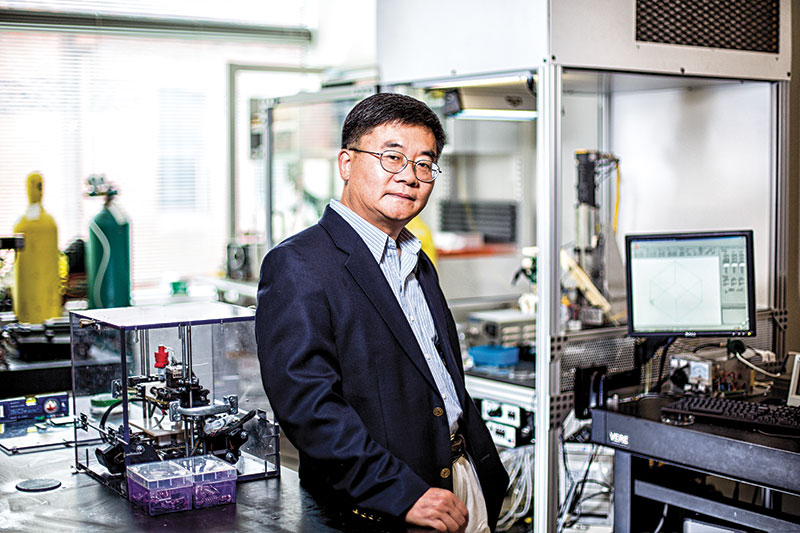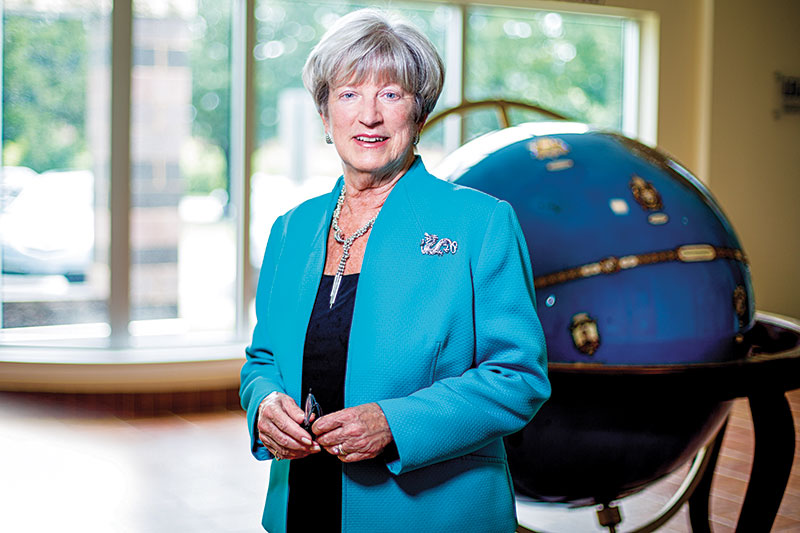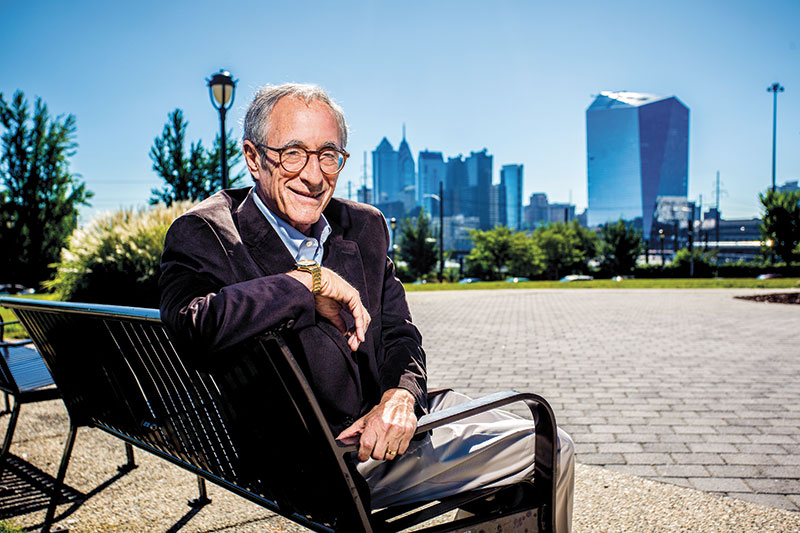Bert Rosenbloom
J. Donald Rauth Distinguished Chair of Marketing Management
LeBow College of Business
The tone of Bert Rosenbloom’s career was struck when he was a teenager, working at his family’s retail music stores.
“I loved the business and the idea of making business decisions and how businesses are run,” says Rosenbloom, who did sales, stock work and later on accounting for the stores that sold musical instruments at six locations throughout the Philadelphia region. “I was fascinated by advertising and customer behavior.”
After leaving the family books behind, he earned a bachelor’s, master’s and doctorate degree in business administration from Temple University.
He joined Drexel in 1976, and combined his interest in business with a love of studying phenomena and research. His specialty is analyzing marketing channels and distribution systems to find ways to improve the efficiency between buyers and sellers.
“There are literally billions of consumers on a daily basis all over the world who need or want millions of different products and services that come from all over the world,” he says. “Somehow this has to be coordinated so consumers get what they want, and millions of sellers and manufacturers and other institutions are able to place their products.”
The J. Donald Rauth endowment — created by the former aerospace and technology conglomerate Martin Marietta Corp. (now Lockheed Martin) in honor of its CEO who served from 1973 to 1983 — in 1999 allowed him to study ways of improving those systems right at the moment that e-commerce was beginning to remake how people buy and sell.
Right now, for example, he’s excited about researching “showrooming,” in which customers go to physical retail stores to look at and touch products, but then order the items from an online outlet at a lower price.
His endowment has been a key helpmate to his work. His research takes him all over the world — he’s been to 50 countries over the years to meet with colleagues and attend conferences, seminars and workshops. The funds also help with the expense of hardware and software technology and datasets — not just for him, but for promising students, as well.
Currently, Rosenbloom is collaborating with a former research assistant (since graduated) who is comparing distribution systems in other countries. Part of his endowment will fund data collection from consumers in the United States and Poland. “Without Dr. Rosenbloom’s support and encouragement I would not have been able to develop as a researcher,” says Boryana V. Dimitrova, PhD.
When he’s not working, Rosenbloom builds furniture in his basement. While most of his handcrafted tables, cabinets and clocks find homes with his two grown children, if he ever decides to sell his designs, he’ll know just how to do it.
Inside Room 330 of the Bossone Research Enterprise Center on Market Street, every available worktable and shelf holds a curious mixture of mechanical and biological science.
Petri dishes. Nuts, bolts and washers. Centrifuge tubes jumbled among wires.
A sticker on the door reads “Biofabrication Lab.”
The lab belongs to Drexel’s Mechanical Engineering and Mechanics Department, but the building blocks being assembled here are alive, and they’re microscopic — measurable in microns.
For the past three years, mechanical engineering professor Wei Sun and a team of graduate student assistants have been experimenting with 3D printing, plasma gas and human cells and proteins. Equipped with engineering expertise and a general understanding of cell cultures (“it’s like gardening,” quips one assistant) they built a prototype of a 3D printing tool that impregnates biodegradable plastic “scaffolds” with bio-friendly chemicals to create a comfortable habitat for living cells.
Though the dream of one day constructing complex organs in a lab is still far off, innovations such as this bring researchers closer to redefining what’s possible in personalized medicine and provide new career options to graduates as traditional manufacturing jobs decline. The “enhanced” plastic scaffolding produced in Sun’s lab could be implanted into a damaged organ to form new tissue. It could be used to study how drugs interact with cells as they pass through the body. Or it could host a sophisticated three-dimensional model of a tumor for study.
On a recent afternoon in the lab, doctoral student Qudus Hamid ’14 gingerly lifts the delicate prototype — picture a hollow glass printer nozzle head — and explains how the team, using the nozzle on a 3D printer, is able to precisely deposit specialized cells onto very thin, customizable layers of plastic by tapping commands into a computer.
“You hit the ‘enter’ key and it’s like Christmas, really,” Hamid smiles.
Hamid’s efforts were partially paid for by someone he’ll never meet — the late Albert Soffa ’44, the co-founder of Kulicke & Soffa Industries who passed away in 2005. An endowment in Albert and his wife Harriet Soffa’s name made Sun’s work on this and other cutting-edge, interdisciplinary projects possible, which in turn attracted more funding. Preliminary work on the prototype helped secure a three-year research grant in 2010 from the National Science Foundation.
Endowments such as Soffa’s are crucial to helping professors and other faculty pursue research and special projects. They allow professors to attend conferences, hire graduate assistants, purchase data and more.
And they bring with them a high level of prestige.
“In academia there is no higher form of recognition than an endowed chair,” says Mark Greenberg, Drexel’s provost.
Universities that can offer the distinction and support of an endowed chair have an advantage in the race to recruit the most accomplished faculty.
Endowments honor donors, as well, with a lasting legacy.
“Endowments can be designated for many different things by the donor,” says Greenberg. “We have some endowed scholarships, we have some endowed chairs for faculty,
we have endowed deanships, and we’ve got endowments that support an entire college, such as the Pennoni Honors College.”
“It lasts as long as the University exists,” says Elizabeth Dale, senior vice president for Institutional Advancement. “Thus, it is both an honor to the named holder of the appointment and also an enduring tribute to the donor who establishes it.”
Over the past 20 years, Drexel has evolved from a regional school with a handful of specialties into a major research institution, but its endowments don’t reflect its rising stature. The University’s 59 endowed chairs and professorships include only 19 endowments worth more than $1.5 million and well-funded chaired professors make up just 1.5 percent of the University’s 1,200 full-time faculty.
To better match the capacity and potential of Drexel scholarship, the University is developing a donor-matching program to encourage gifts of the sort that are enabling
Sun to advance the field of tissue engineering and prepare his graduate students for eminent careers in advanced manufacturing.
On these pages we look at some endowed Drexel faculty and their work.
Wei Sun
Albert and Harriet Soffa Professor, Mechanical Engineering and Mechanics College of Engineering
Wei Sun is at the forefront of an exciting new interdisciplinary field that could one day remake modern medicine, but don’t expect him to list his achievements.
“I’m proud of what I do, but I like to be low-key,” says Sun, who has held the Albert and Harriet Soffa Professorship in the College of Engineering’s Department of Mechanical Engineering and Mechanics since 1998.
His natural humility stems from his upbringing in China, where he lived until relocating to the United States at age 27 to pursue his education. That same culture impressed upon him the importance of education.
“From a very young age, one of my goals was to be a professor,” he says. “In the environment I come from […] to be a professor, to study, is the most noblest thing.”
Sun earned a bachelor’s degree in mechanical engineering from Hefei University of Technology in China and then a master’s in mechanical engineering in 1988 from Drexel, where he also completed his doctorate in 1992. In 1994, Drexel recruited him to be director of its new product-development center, and he’s been at the University ever since.
Sun is an authority on biofabrication, a cutting-edge field of research and technology that uses cells, proteins and other biological materials as building blocks to fabricate biological models and systems and medical therapeutic products.
His particular interest is in computer-aided tissue engineering, which combines the fields of life sciences and engineering in the design and manufacture of human tissue.
The process may one day be used to replace or repair organs.
“It’s not a dream; there is an assumption it will happen,” he says. “Years ago, people speculated, but right now people are not speculating. People know it is possible, it is just difficult.”
His research could lead to new drug developments and to drug-testing methods that reduce the need for animal and human subjects.
“The ultimate goal is to enhance the quality of life for people,” he says.
Sun’s efforts have put him at the helm of the emerging field. In 2008, he was elected editor-in-chief of the journal Biofabrication, published by the Institute of Physics. In 2010, he was elected president of the newly formed International Society for Biofabrication.
In 2012, he was appointed co-director for the Drexel-Shanghai Advanced Research Institute Joint Center in Shanghai, China — Drexel’s first overseas facility. He was charged with leading one of the institute’s first research collaborations — a project using 3D cell assembly technology to generate in-vitro cellular cancer models used for drug screening testing.
How does he do it all?
“You work all day and night,” he says, with a soft laugh. “You have to be very careful to manage your time and you have to work hard, like anybody else. You just sleep less.”
Lynn Yeakel
Betty A. Cohen Chair in Women’s Health
Director, Institute for Women’s Health and Leadership
College of Medicine
Lynn Yeakel donated the globe pictured behind her when the Institute for Women’s Health and Leadership opened in 2009 in the new wing of the East Falls building. Markers on the globe designate all the places where graduates of Drexel University College of Medicine and its predecessor institutions, Hahnemann University and Woman’s Medical College of Pennsylvania, have practiced.
Soon after being hired as the director of the College of Medicine’s Institute for Women’s Health in 2002, Lynn Yeakel made an executive decision: She added the words “and leadership” to the institute’s title.
It was a fitting move, both for the institute and Yeakel, whose role in public service spans decades.
“The women who have graduated from this medical school have been trailblazers as leaders in medicine,” says Yeakel. “In many ways the evolution of women’s health being recognized as different from men’s has been because of the leadership of women.”
Her position as director of the institute and as the recipient of the Betty A. Cohen Chair in Women’s Health allows her to continue on this path. Cohen is the late wife of D. Walter Cohen, a current Drexel University College of Medicine trustee and past president of the Medical College of Pennsylvania. The professorship named in her honor was the first in the world to focus on women’s health issues.
“Multiple programs would not exist had it not been for the chair and endowment,” she says. “That provided an element of stability and predictability in our budget.”
She credits that stability with enabling her to create Vision 2020, a national coalition she launched in 2010 that is dedicated to helping women achieve social and economic equality by the year 2020.
She’s also proud of the more than $1.2 million in medical scholarships the institute has been able to provide through the Woman One program since 2003 to underrepresented minority women to help them study medicine. “These amazing young women might not have been able to realize their dreams and become physicians without the financial support and they will serve millions of underserved people in the course of their careers,” she says. “That’s very rewarding.”
The desire to serve is part of Yeakel’s DNA. Her father was a U.S. congressman from Virginia for 22 years, and her mother was a teacher and school principal at a time when women were mainly expected to be homemakers. “I grew up in that kind of household, where public service was revered,” she says.
She became involved with women’s organizations and co-founded the advocacy and grant-making organization Women’s Way, where she also served as CEO from 1980 to 1992. In 1992, she made a run for the U.S. Senate and in 1994 President Clinton appointed her Mid-Atlantic regional director for the U.S. Department of Health and Human Services. She ran for governor in 1994, and state senator in 2000.
Today her position at Drexel allows her to continue her public service. The days are busy, but she shows no signs of slowing down.
‘We have to keep moving, because there’s a lot to do,” she says.
Drexel’s Newest Endowed Chair
On Oct. 21, a $2.5 million endowment in honor of the late Richard Shuman was awarded to Cheryl A. Hanau, who has served as chair of the Department of Pathology and Laboratory Medicine in the College of Medicine since 2009.
The Richard Shuman, M.D. Chair in Anatomical Pathology follows the recent passing of Marie Shuman, Richard’s wife. Marie’s will established the endowment to honor her husband’s significant achievements and foster future contributions in his field.
Hanau says the funding couldn’t have come at a better time.
“There is a lot going on, especially with molecular diagnosis and bioinformatics,” says Hanau. “We’re getting all kinds of new tools to help with personalizing each patient’s treatment to address their specific biology. Getting this funding will allow us to do more innovative and exciting things in our department.” — Katie Clark
Jeffrey Greenhaus
William A. Mackie Chair in the Department of Management
LeBow College of Business
When one of his doctorate students came to him many years ago wanting to do a dissertation on work and family dynamics, Jeffrey H. Greenhaus could relate to the topic.
“In my personal life as I got married and had children, I felt the pressure and the conflict between my career and my family,” says the Brooklyn-born business management professor.
At that time, he was early in his career as an associate professor at the Stevens Institute of Technology in Hoboken, N.J., trying to succeed both as a professor and a father of two daughters.
“Whatever I did, there was some kind of stress involved; when you choose one activity that means you can’t do another,” recalls Greenhaus, who holds a bachelor’s degree from Hofstra University and a doctorate degree in industrial organizational psychology from New York University.
Greenhaus’ interest in work-life issues persisted after he joined the LeBow College of Business in 1981. His 1991 appointment to the William A. Mackie endowed chair — named in honor of an executive vice president of Ingersoll-Rand Co. after he passed away in 1981 — helped Greenhaus study the topic just as the idea of “work-life balance” was becoming mainstream.
The endowment has been a professional lifeline allowing him to attend more conferences and publish more articles, books and book chapters. One of the projects he was able to complete as a result was a survey on the work-life balance of Drexel alumni. Recently, he co-edited and contributed to a 2013 book titled, “Expanding the Boundaries of Work-Family Research: A Vision for the Future,” and he’s talking with publishers about a new book.
He’s currently studying work-family dynamics from a decision-making perspective to understand how individuals’ work-related decisions are affected by their family life. One dynamic he’s investigating is how women restrict their hours to accommodate their families, whereas men tend to work long hours no matter what.
With 40 years in academia behind him, Greenhaus can claim many professional honors, but his biggest source of career satisfaction is personal — and he says he owes it in part to the endowment. “What I’m most proud about in my career…is that I’ve been at it for a long time and I’m still interested,” he says. “I’m still engaged, I’m still curious and I’m still productive.”
And, perhaps taking his own research to heart, he makes sure to spend time with the other passions in his life — his family, including five grandchildren.
“It’s wonderful,” he says.






